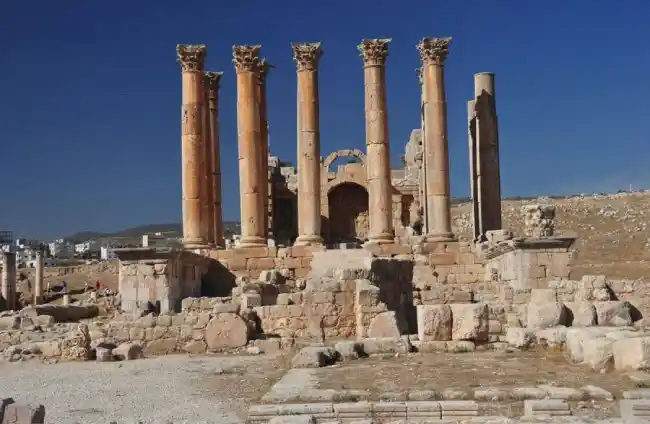In this article, we will provide a comprehensive guide to exploring Turkey during a two-week trip. From ancient ruins to stunning beaches, vibrant markets to delicious cuisine, Turkey offers a diverse range of experiences for travelers. Whether you’re interested in history, nature, or simply relaxing by the sea, Turkey has something for everyone.
Table of Contents
- What historical sites should you visit in Turkey?
- What natural wonders can you explore in Turkey?
- What cultural experiences should you seek out in Turkey?
- What outdoor activities are available in Turkey?
- What are some tips for traveling in Turkey?
- Conclusion
- FAQs
What historical sites should you visit in Turkey?
Temple of Artemis

Library of Celsus
Ephesus
Hagia Sophia
One of the must-see historical sites in Turkey is the ancient city of Ephesus. Explore the well-preserved ruins of this once-thriving city, including the Library of Celsus and the Temple of Artemis. Another iconic site is the Hagia Sophia in Istanbul, a stunning example of Byzantine architecture that has served as a church, mosque, and now a museum. Don’t forget to visit the fairy-tale-like rock formations of Cappadocia, where you can take a hot air balloon ride for a bird’s eye view of the landscape.
What natural wonders can you explore in Turkey?
Pamukkale
Head to Pamukkale to see the unique terraces of white travertine, formed by mineral-rich thermal waters cascading down the hillside. You can also visit the stunning Turquoise Coast, known for its crystal-clear blue waters and picturesque fishing villages. For outdoor enthusiasts, the Lycian Way offers a scenic hiking trail along the Mediterranean coast, passing through ancient ruins and charming villages along the way.
What cultural experiences should you seek out in Turkey?
Immerse yourself in Turkish culture by visiting the Grand Bazaar in Istanbul, one of the world’s oldest and largest covered markets. Sample traditional Turkish cuisine such as kebabs, mezes, and baklava in local restaurants and cafes. Be sure to attend a whirling dervish ceremony to witness the mystical dance of the Mevlevi Order, a Sufi Islamic sect that originated in Turkey.
What outdoor activities are available in Turkey?
For adventure seekers, Turkey offers a range of outdoor activities such as hot air ballooning in Cappadocia, white-water rafting on the rivers of Antalya, and paragliding over the Blue Lagoon in Oludeniz. If you prefer a more relaxed pace, you can cruise along the Aegean or Mediterranean coast on a traditional gulet boat, stopping to swim in secluded bays and explore ancient ruins.
What are some tips for traveling in Turkey?
When visiting Turkey, be sure to respect local customs and traditions, such as covering your shoulders and knees when entering mosques or religious sites. It’s also a good idea to learn a few basic Turkish phrases to communicate with locals and show appreciation for their culture. Finally, don’t forget to try the traditional Turkish bath experience, known as a hammam, for a relaxing and rejuvenating spa treatment.
Conclusion
With its rich history, stunning natural beauty, and warm hospitality, Turkey is a destination that will captivate and enchant you. Whether you’re exploring ancient ruins, relaxing on pristine beaches, or indulging in delicious cuisine, Turkey offers a truly unforgettable travel experience. So pack your bags and get ready to embark on the journey of a lifetime in this beautiful country.
FAQs
1. Is Turkey a safe destination for travelers?
While Turkey has had some security concerns in recent years, overall it is considered a safe destination for travelers. By exercising common sense and staying informed about local conditions, you can enjoy your trip to Turkey without any major issues.
2. What is the best time of year to visit Turkey?
The best time to visit Turkey depends on your preferences. Spring (April to June) and autumn (September to November) are considered ideal for mild weather and fewer crowds. However, if you want to enjoy the beach and swimming, summer (July to August) is the prime season.
3. What is the currency used in Turkey?
The official currency of Turkey is the Turkish Lira (TRY). It is recommended to exchange your currency for Lira upon arrival in Turkey for the most favorable rates. Credit cards are widely accepted in major cities and tourist areas.
4. Do I need a visa to visit Turkey?
Most visitors to Turkey require a visa, which can be obtained online or upon arrival at Turkish airports. Make sure to check the visa requirements for your specific nationality before traveling to Turkey.
5. What are some traditional Turkish dishes to try during my visit?
Some must-try Turkish dishes include kebabs (such as doner and shish), mezes (appetizers like hummus and tabbouleh), and baklava (a sweet dessert pastry). Don’t miss out on trying Turkish tea and coffee, as well as traditional dishes like manti (Turkish dumplings) and lahmacun (Turkish pizza).
I’m Veronica Collins, a passionate traveler and designer from USA. I believe in blending creativity with exploration, whether through design, fashion, or discovering new destinations. My journey is all about embracing new experiences and sharing them with others to inspire a lifestyle of discovery and self-expression.